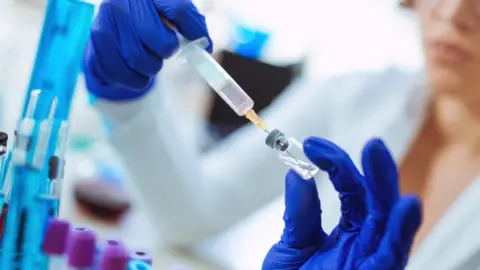Covid vaccine research now helping cancer patients
 BBC
BBCTen months ago, Adrian Taylor was told he had incurable cancer and there were few treatment options left.
Despite several gruelling months of chemotherapy and radiotherapy, his tonsil cancer had spread to his lungs and was growing rapidly.
"It is devastating news to anyone and at the time I was 53 years of age," he says.
"You think 'I've only just started living - I've young children and what are they going to do without me? What's my wife going to do?' It's terrifying."
Mr Taylor, from Wirral, is talking to me at The Clatterbridge Cancer Centre, where he's now involved in what many hope will come to be seen as the start of revolution in cancer treatment.
For the past few months he's been participating in a clinical trial that owes much to the pioneering work carried out during the race to find a Covid vaccine.
"I had nothing to lose," he says. "There was a 100% chance I was going to die without treatment so I grasped everything I could and just said put me down for everything."
Two hospitals in Liverpool are helping lead the way in this new field of medicine, and the initial results are promising.
Mr Taylor comes to the centre's clinical trials unit every two weeks and, along with other treatment, receives a vaccine.
 Getty Images
Getty ImagesIt uses the same mRNA technology as most Covid vaccines and operates on the same principle - training the body to fight and destroy harmful diseases.
It's fair to say that without the pandemic, this trial would probably not exist - the huge concentration of money and effort to find a Covid vaccine also massively accelerated progress in this cutting-edge field.
"This technology harnesses defects in the cancer cells and creates personalised vaccines for the individual," says the centre's medical director Dr Sheena Khanduri.
"It's hugely exciting and it really represents a paradigm shift in the knowledge we have about how cancer vaccines work."
Clatterbridge - working in partnership with the Royal Liverpool Hospital next door, along with the University of Liverpool - is running a number of world-first clinical trials on cancer vaccines.
'Personalised medicine'
At the Royal Liverpool, scientists are preparing to start another trial, using mRNA vaccines following bowel cancer surgery.
Tumours are removed by surgeons and are then analysed in the lab.
"We look at the genetic code for the cancer and then we make a specific vaccine for that patient so the vaccine is targeting their individual cancer," explains consultant liver surgeon Rob Jones.
"It's the ultimate personalised medicine."
Mr Jones and his team are leading a national trial involving nine other hospital trusts.
"The great advantage of vaccines is that they can be delivered everywhere," says Mr Jones. "You will have had a flu or a Covid vaccine delivered in a GP setting or a school hall.
"With cancer vaccines exactly the same thing can happen. This is walk in, have a jab, walk out. And that can be rolled out across the country."
'Last chance saloon'
Many researchers think vaccines will revolutionise cancer treatment in the near future.
But in the here and now nearly every NHS trust is battling to reduce the backlogs in cancer care caused by the same pandemic that helped accelerate the research programme.
"It is challenging," acknowledges Mr Jones. "We've had to work differently to try and make the situation better. We have adopted different strategies. We've tried operating in different hospitals and different places.
"The big pressures are on things like waiting times for scans and access to other therapies that we need to help drive the surgery though."
Back at Clatterbridge, Mr Taylor has finished his latest treatment session. He has some good news.
The latest scans reveal that his tumours, which had been growing rapidly, have now shrunk dramatically.
"I think they've been amazed at the progress, seeing that the original hope was that the cancer would be kept at bay - it wouldn't spread, it wouldn't grow," he tells me.
"It's saved my life basically, there is hope now. The trial was a kind of last chance saloon for me.
"The future is positive now. It really is."

Why not follow BBC North West on Facebook, Twitter and Instagram? You can also send story ideas to [email protected]
